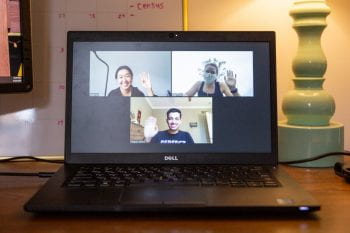
In March, student groups across the university were forced to stop operations as ‘normal’ due to the outbreak of the COVID-19 pandemic. Some groups were able to continue meeting online. For community engaged groups, volunteering came to a complete halt. For Partners in East St. Louis (PESTL), this meant a disruption of their weekly program.
“We usually have a classroom full of students to talk about college access related things,” said Mae Hubel, president of one of their branches, College Access Mentoring. This semester, they worked with the Director of College Access and Persistence at East St. Louis High, Staccy Lampkin, on a plan that could still meet students’ needs. “She thought it would be best if we worked with a smaller number of students who had the time and mental space to do more online learning. So we’re doing Google Hangouts and working on compiling a Google Drive with a timeline and folders of resources like scholarship applications, personal statement help, or SAT prep. It’s nice because the students can access it and jump in with whatever they need to work on.” They also are able to use the virtual screen sharing option to walk them through navigate platforms like Naviance and College Board. Mentors and mentees are meeting once a week this semester.
The Health Clinic branch of PESTL has had different challenges adapting. “Our partner, Eastside Health District, has been pitching in with contact tracing efforts so a lot of their staff has shifted responsibilities,” shared Jaclyn Liu. They haven’t been able to continue operations in an online form. Instead, her branch has decided to revisit some of the projects they had started in previous semesters like compiling resources accessible with Medicaid and mapping food banks in the area.
Pratyush Sridhar, the president of all branches of PESTL sees this moment as an opportunity. “This has been a chance for exec members to make changes in their own branches. All branches are coming together for ongoing facilitated dialogues,” he mentioned. In the past, most of the PESTL branches have focused on learning through in-person volunteering, but they are taking this semester to do some group learning about the history of East St. Louis. “It’s important to be aware and learn more about where you’re volunteering, whether it be policies or other things that affect the people you work with,” Sridhar said. The group is reconfiguring its volunteer training to be more intentional and aligned with their mission.
Equally important, they want members to realize that community engagement is an ongoing process. Hubel noted, ‘It’s one of the reasons that we’re having a discussion series instead of just one. Things evolve. I’m learning that community engagement is a continuous process of taking in new information, reflecting upon it, applying new learning, and doing it again.”
When asked what advice they would give to other student groups this semester, Liu offered, “Have more conversations. This is an opportunity to look internally and see how you’re moving forward as an organization in light of conversations happening at a national level.”
The Gephardt Institute has created a resource called, ‘Guidance for Community Engagement during COVID-19’ to support students, faculty, and community organizations in adapting to remote engagement. Staff are available for consultation through virtual open hours by appointment.
Photo caption: Student leaders Jaclyn Liu, Pratyush Sridhar, and Mae Hubel sharing about how they have adapted to the world of remote community engagement.